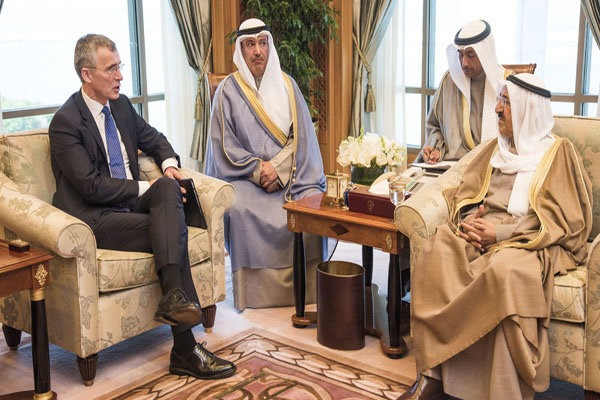In an interview with the website of the Strategic Council on Foreign Relations, Dr. Abdolreza Faraji Rad emphasized: Therefore, states that constantly provide countries around the world such as the United States, Britain and France with bases, cannot make independent decisions in relation to their national interests, and naturally other countries influence their decisions and they should be subject to the views of countries which have bases there in their decision-making.
He said: Of course, those countries have independent cooperation with NATO members, but this cooperation is not within the framework of NATO, and only recently there has been talk about Qatar becoming a member of NATO, which also has its own reasons. In fact, countries like Bahrain, the UAE, Kuwait and Saudi Arabia have independent cooperation with NATO members, but this cooperation is not within the framework of NATO.
Faraji Rad added: For example, in Kuwait there are British and American forces and in the UAE there are French, British and American troops, but such presence is not within NATO. Therefore, such presence of those forces is independent, but they cooperate with each other in the region with an aim of maintaining the security of the Persian Gulf.
Faraji Rad also said that the United States itself has military bases in most of the Arab countries south of the Persian Gulf, such as Iraq, Kuwait, Saudi Arabia, Bahrain, Qatar, the UAE, etc.
Referring to the fact that presently there is the discussion over Qatar-NATO cooperation, eh said: One of the reasons for such cooperation is that when tensions arose between Qatar and Saudi Arabia, Bahrain and the UAE, Turkey rushed to Qatar’s help and deployed a number of forces in that country. Therefore, it is likely that the green light provided by the Qataris for cooperation with NATO is more to justify presence of Turkish forces in Qatar, which is a key member of NATO.
Faraji Rad added that Turkey wants its forces to remain in Qatar, thus it seeks to have a political justification for its measure.
Commenting over Qatar’s willingness to join NATO, the expert on geopolitical affairs said: Although Qatar’s relations with Saudi Arabia and the UAE have improved to some extent, there is still no trust and there are concerns that those countries may once again threaten Qatar. Therefore, Qatar is willing to cooperate with that organization.
According to the expert, given that countries such as Britain, the United States and France have often their bases in Arab countries, there is no justification for NATO to set up bases in those countries.
Saying that NATO has 500 forces in Iraq, he said: NATO wants to increase its forces to 5,000, mainly to train Iraqi forces.
The expert, noting that NATO is not much prepared to play a role outside Europe, further remarked: After 9/11, when the United States arrived in Afghanistan, it sent troops to Afghanistan within the framework of NATO, and countries like Britain, Germany, Italy, Turkey and Australia also supported the move, whether in the form of military assistance or political and logistics assistance.
Explaining the history of NATO operations in Afghanistan, he said: In fact, with the exception of Australia and Britain, other countries were not interested in being present in the Afghan conflict and over time tried to withdraw their forces from Afghanistan.
Emphasizing that European NATO members are not interested in interfering in the affairs of the Persian Gulf and the Middle East, he said: Because they do not have a good experience in Libya, and after a decade of NATO intervention in Libya, we are now witnessing what a bad situation the country is experiencing and that NATO intervention in the country has achieved no success.
He added: In fact, intervention of European NATO member states in Libya only increased migration and terrorism for them.
The expert on geopolitical affairs also commented on NATO presence and cooperation in the Persian Gulf region and said: It does not seem that NATO now in the Biden era is willing to increase cooperation in the Persian Gulf. Because the situation was different during Donald Trump’s presidency and Trump did not cooperate with NATO. But Biden’s team has said it wants to resolve the issues through diplomacy. Therefore, at this point, NATO’s presence in the Persian Gulf has no justification and it is unlikely that anything other than the question of Qatar will be raised within the NATO framework.










0 Comments